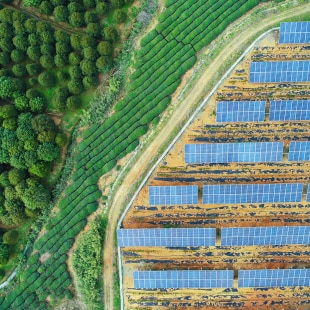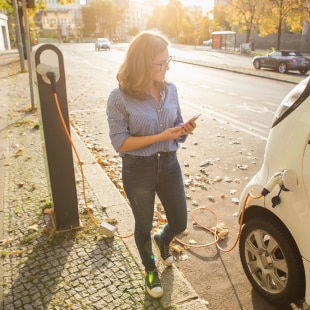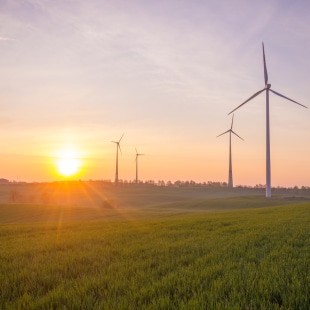Appropriating the energy transition goals
“Being able to produce clean and affordable energy”: the7th UN Sustainable Development Goal is dedicated to the energy transition. It is based on short-term objectives: by 2030, the international mobilisation will make energy, in its most sustainable form, accessible to all. As such, the energy transition is more than ever, at the heart of a responsible and sustainable global economy.
Each country is responsible for framing this objective with suitable mechanisms and legislation, and for their economic agents to anticipate or implement them. Citizens also contribute by changing their habits.
In France, the environmental transition for green growth law has set objectives that include:
- reducing final energy consumption by 50% by 2050 vs. 2012, while targeting an intermediate objective of 20% by 2030;
- reducing consumption of primary fossil fuels by 30% by 2030 vs. 2012;
- raising the portion of renewable energies to 23% of gross final consumption by 2020 and to 32% of gross final energy consumption by 2030.
In this race against time, the banking and finance sector must be at the forefront of the establishment of a low-carbon economy. Situated at the intersection between individuals, businesses and investors the Bank is a motor of the economy and can influence change. Using financial and investment levers, it can strongly encourage its clients to engage in responding to the urgency of the situation.
Acting at the source: promoting the development of renewable energies
Renewable energies are energies that are renewed by nature more rapidly than they are consumed by people -, unlike fossil fuels, such as coal and oil - whereas clean energies have a low-carbon impact. Wind power (both onshore and offshore), hydropower, solar, biomass and geothermal are the five main renewable, or green, energies. To limit climate risks, use of these energy sources must be expanded. A responsible recovery will therefore mean promoting their use, while making them, and their financing, more accessible.
How can a bank such as BNP Paribas influence the acceleration of renewable energies to increase their proportion in the global energy mix?
Examples of initiatives include:
- Phasing out of fossil fuels: Group BNP Paribas has adopted a precise timetable for exiting coal by 2030 in European Union and OECD countries, and by 2040 in the rest of the world. It is one of only two major global banking groups to have done so. The Group has also pledged to reduce its support for other fossil fuels In 2019, the electricity mix financed by BNP Paribas broke down into 46.7 % fossil fuels (gas, coal and petrol) and 31% renewable sources, leaving the Bank with an average carbon footprint that is lower that the global mix which in 2018 was split into 64% fossil fuels and 26 % renewables.
- Increasing our financing of renewable energies: BNP Paribas has doubled its financing of renewable energies in four years (instead of five) and set a new goal for 2021 at 18 billion euros. This commitment is measured very precisely, whether in offshore wind facilities (such as the financing of France’s first offshore facilities, at Saint-Nazaire and Fécamp, of more than 2 billion euros each), financing and advisory that it provides to the European auto battery gigafactory at Northvolt Ett, Sweden (2.4 billion dollars), or its role as financial advisor to the world’s largest renewable energy project (an offshore wind park off the coast of the UK, with a capacity of 3.6 gigawatts).
- Building strategic partnerships with other major economic agents such as the partnership between BNP Paribas, Solar Impulse, Michelin and ENGIE under the umbrella of Movin’On, for the purpose of promoting decarbonated energies.
Start at home, to accelerate change
BNP Paribas helps its individuals clients in their renovation works by making the process easier thanks to the new website "monprojetrenovation.com".
In practical terms, within five years we have doubled our loans dedicated to renewable energy production to encourage the energy transition.To meet the transition challenge, let’s pick up the pace together.
Influencing behaviours: offering real-world solutions to producers and users
Companies, especially financial firms, can assist this collective push by adjusting their offerings to energy transition goals. Demand from users, along with the products and services that are offered to them, have an impact on the economy and society. It is up to each economic agent to take on this responsibility based on its means and its line of business.
In practical terms, we funded the energy renovation projects of 80,000 French customers in 2019, and in 2020 we are continuing to do so, with the Energibio zero-interest loan.To meet the transition challenge, let’s pick up the pace together.
The Saint-Nazaire wind farm project
In five years, BNP Paribas has doubled its financing and loans commitments in the sector of renewables energy. Discover the first wind farm project in France.
New financing tools dedicated to the energy transition
At BNP Paribas, we have designed new financing tools dedicated to the energy transition for our customers in various sectors who seek both environmental utility and cost-effectiveness.
Three major financial tools are now available for renewable energies:
- The BNP Paribas Energy Transition line of green investment funds and socially responsible investments in general.
- Green bonds or Green corporate bonds: between January 2019 and June 2020, our clients mandated us for over 64.5 billion* euros-worth of green bonds issuances, thus making us the world leader in the market to support corporate and sovereign needs in their ecological transformation. *Source: Dealogic
- Sustainability-linked loans (SLL) are an innovative product in which BNP Paribas is both a pioneer and a leader, with more than 7% global market share
Focus on two green bonds
- Enel, a global energy producer and distributor, launched an SLB with the goal of making 60% or more of its energy capacity renewable by the end of 2022. This is its third SLB and its first denominated in sterling.
- Volvo Cars, has mandated BNP Paribas as its green structuring advisor, in establishing a green financing framework. This helped Volvo Cars raise the funds it needed to finance its own investment in electrical vehicles (EV) with plans to shift its production ratio to 50% entirely EV cars and 50% hybrid vehicles by 2025.
Focus on wind-power financing in Argentina through a BNP Paribas SLL
YPF Luz, Argentina’s fifth-largest power producer, has pledged to raise its wind power production from 123 megawatts in 2020 to 297 megawatts in 2021, an increase of more than 240%. This is a major investment that has required significant financing needs, despite the prevailing economic instability in Argentina.
This financing was provided through several international sources having an interest in renewable energies, including a 95 million dollar loan granted by BNP Paribas Fortis.






